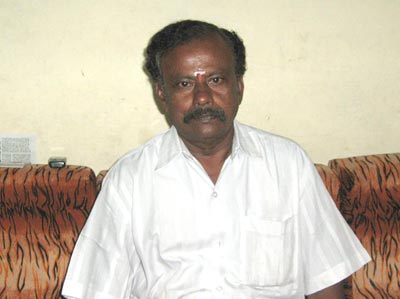|
| Help | |
| You are here: Rediff Home » India » News » First Look |
|
Slumdog Millionaire [Images] has received tremendous international recognition and highlighted Mumbai's [Images] underbelly. While some hail it as a grand endorsement for the city, others think of it as a sorry stereotype.
Rediff.com correspondents met residents of the city's slums to find out what life really means for them.
 T Jaishankar, Dharavi, Mumbai
T Jaishankar, Dharavi, Mumbai
Dharavi is the largest slum in Asia. Lest you think of it as just a sprawling ghetto of poverty, it also is home to some of the most industrious people in the city. The turnover per year from the scores of small business units that dot this expansive slum is said to be Rs 3,000 crores (Rs 30 billion).
Its entrepreneurs manufacture leather products, bangles and potato wafers every day. The prosperous residents of Dharavi have not become millionaires by appearing on quiz shows or by winning lotteries. What they have achieved is through blood, tears, sweat and untiring toil.
T Jaishankar, a longtime resident of Dharavi, earned his success with nothing else but tremendous hard work. He came to Mumbai in 1967 and began his career as an errand boy in a small restaurant. Forty years later, he is a millionaire. This is his rags to riches story, told in his own words:
I came to Bombay in 1967. I was 13. I went straight to Dharavi because my elder brother lived there. It felt like home as everyone spoke Tamil in the neighbourhood. I worked for a month in a restaurant called Nellai Vilas.
The eatery had a special meaning for me because my district in Tamil Nadu was also called Nellai.
After a month, a vegetable shop owner offered me a job for Rs 15 a month. This was more than what I was getting at the hotel. So I left and joined him.
Though I worked with him for 18 months, he paid me only for 12. His excuse was, 'You don't know Hindi, so consider the first six months as your training period.' On hearing this, I quit.
I then got a job as a cook but had to leave when I fell sick. It was then that I decided that I would not work for anyone and would be my own boss.
So in 1969, my brother and I started selling vegetables. We used to carry them in a basket on our heads and go from house to house in Sion (north central Mumbai) to sell them.
In 1970, we bought a 100 square feet shop in Dharavi for Rs 300 and sold groceries. We would buy goods in small quantities for the shop because we did not have the money to buy more.
Meanwhile, my brother and I took turns to sell vegetables from house to house. One of us would man the shop when the other sold vegetables.
We then had some money to rent another shop where we sold vegetables and dried fish. We continued doing our rounds of selling vegetables in the morning.
Then in 1972, we managed to rent a shop inside Sion vegetable market. Later we bought the shop for Rs 3,000. This brought an end to selling vegetables from door-to-door, but we continued to deliver vegetables to customers' homes from our shop.
Then we bought two shops and sold groceries. Our hard work was paying off because we subsequently added two more shops and were able to buy two houses. We also started two restaurants and a shop in which we sold vegetable oil. I started a phone booth too.
It has been a slow and long journey, but it has been fun. I married a girl from our district and have five sons. My friends and relatives call them the Pandavas and my wife as Kunti devi.
I have educated my sons very well. The first has a MBA degree. The second is an IT graduate. The third is studying physiotherapy. The fourth is doing a course in hotel management and the youngest is in Class X.
Two years back, our property was divided among us four brothers. At that time it was worth Rs 1.5 crores (Rs 15 million).
For my share, I got the oil shop, the phone booth and a house. I have since closed the oil shop and converted it into a beer and wine store. It is doing well.
I am now old and have diabetes, I can't work as hard I used to. But I look back at my journey with great satisfaction.
I still live in Dharavi and will always live here.
Text, Photograph: A Ganesh [Images] Nadar
Earlier in the series:
| Email | Print | Get latest news on your desktop |
|
|
| © 2009 Rediff.com India Limited. All Rights Reserved. Disclaimer | Feedback |